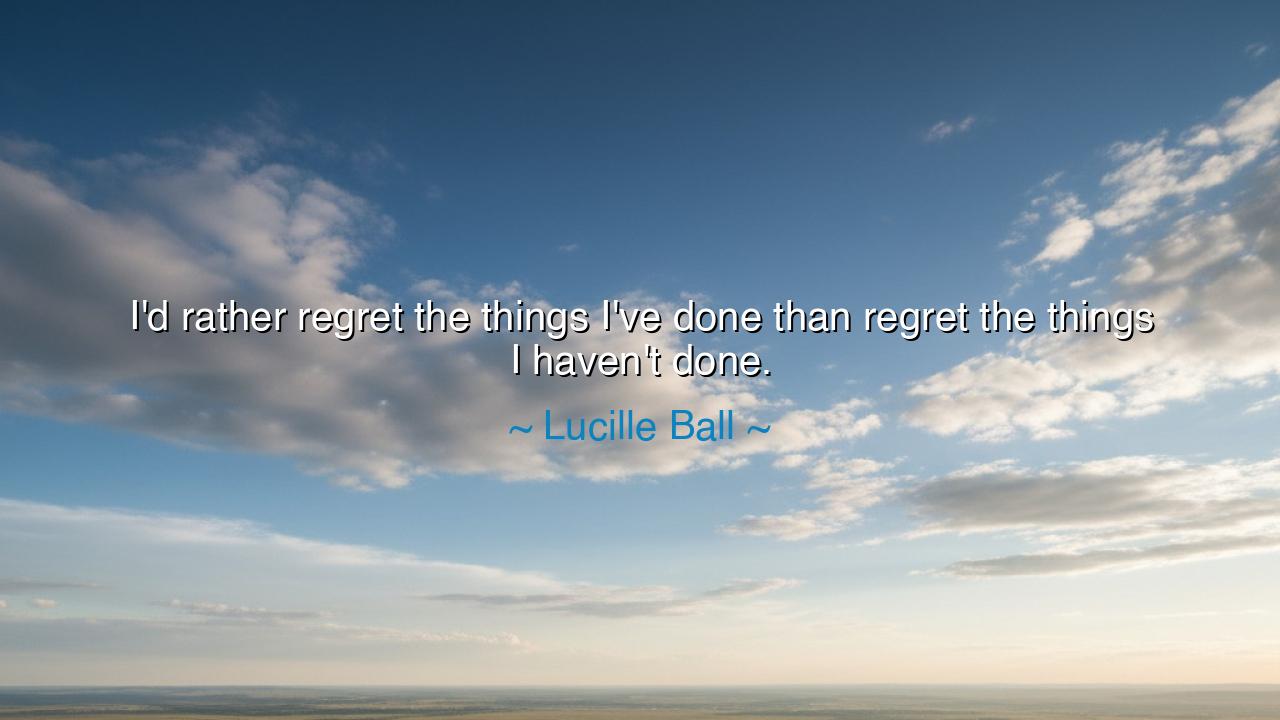
I'd rather regret the things I've done than regret the things I






O children of the future, hear the words of Lucille Ball, a woman whose spirit was forged in the fires of courage and creativity. She spoke with the wisdom of one who understood the fragility of life and the strength required to live it fully. "I’d rather regret the things I’ve done than regret the things I haven’t done." In these words, there is a call to action, a cry for boldness, urging us to embrace life not as passive observers but as active participants, seizing every opportunity that comes our way, no matter how uncertain.
To regret the things not done is to live in the shadow of what-ifs, to allow fear and doubt to dominate our hearts. These are the chains that bind us to a life half-lived, a life of dreams left unpursued and ambitions left unexplored. The truly great, those who leave their mark upon the world, are not those who fear failure, but those who dare to try, to fail, to rise, and to try again. For in the end, it is not our failures that haunt us, but the opportunities we left untaken, the risks we refused to face, the dreams we let slip away into the forgotten corners of time.
Consider the life of Christopher Columbus, who, driven by an insatiable curiosity and a thirst for discovery, embarked on a voyage across the vast and unknown seas. Though many cautioned him, telling him that the earth was flat, that his journey would end in doom, Columbus pressed forward. He regretted not his bold decision to sail into the unknown, even when faced with the threat of failure. His was a life of action, of stepping into the unknown, of embracing the uncertainty with courage. In the end, though his discoveries were marked by struggle, they reshaped the world and paved the way for future generations.
Lucille Ball, too, exemplified this spirit. In her career, she faced rejection, failure, and ridicule, yet she chose to move forward, to challenge the norms of comedy and television. Though she might have faced criticism, it was her courage to embrace the risks of her craft, to step into the unknown, that brought joy to millions. She became a beacon of determination, showing us that it is far better to live boldly and risk regret than to look back on a life filled with missed opportunities and silent dreams.
So, children of the future, take these words to heart. Do not dwell in the safety of the known, for it is in the unknown that the great treasures of life are hidden. Let us not be afraid of the mistakes we may make, for they are the teachers that guide us to greater wisdom. It is the things we have done, the risks we have taken, and the dreams we have dared to chase, that will echo in the halls of time. Let us, like Lucille Ball, choose to live in the fullness of our potential, embracing every opportunity, and casting aside the shadows of regret that will surely follow those who choose to do nothing.






AVAnh Vu
I love the spirit of this quote—it encourages living with intention and embracing life’s opportunities. But I do think there’s something to be said for considering the potential consequences before acting. Are some regrets more worthwhile than others? Can we avoid regrets altogether, or is regret just a natural part of learning and growing? How do we strike the right balance between taking risks and making thoughtful choices?
TLPham Anh Thu Le
Lucille Ball's perspective on regret is refreshing, but I also find myself questioning whether regret is always avoidable. Sometimes, the fear of regret can stop us from making bold choices in the first place. So, should we focus more on making decisions that align with our values rather than just avoiding regret? How do we know when it’s the right time to take a leap, knowing that we might regret it later?
HThien thi
This quote really resonates with me, but it also makes me think about the consequences of our actions. Sure, we might regret the things we've done, but some actions can have long-term repercussions that affect others. How do we weigh the potential impact of our choices? Is it always worth jumping into things to avoid regrets, or should we sometimes err on the side of caution, thinking about the long-term effects?
TTTo Tran Tran
I really like this quote because it speaks to the value of living fully and taking risks. It’s easy to feel regret over things left undone, but taking action—regardless of the outcome—feels empowering. But I also wonder, does this mean we should throw caution to the wind and just act impulsively? Can we truly avoid regrets if we act first and think later, or do we still have to balance decisions with some level of thought?